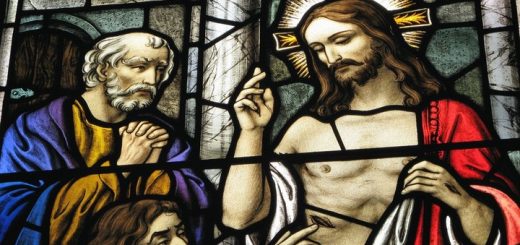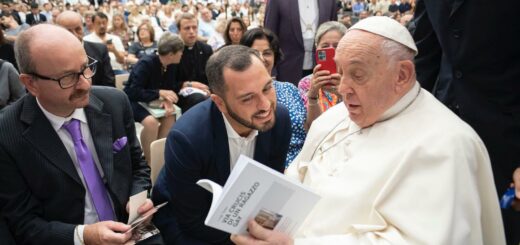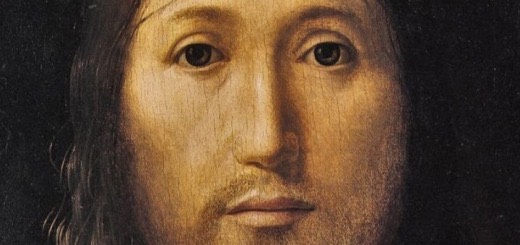Is God dead today? We killed him or maybe not!
Reflections by Brian G. Murphy* published on Queer Theology.com (United States), freely translated from Innocenzo Pontillo
Eleven years ago I wrote an article that began with a quote by Friedrich Nietzsche: "God is dead! God remains dead! And we killed him!". I continued saying: "I pass at least two days a week to believe that God does not exist. That we are a deeply surprising collection of molecules, cells, fibers and electrical impulses and that at the end of everything we will return dust".
Nowadays, my "faith" in God is more similar to Schrödinger's cat: he is alive and dead at the same time (we will talk about it later).
Holy Saturday (before Easter) is a Christian holiday that I didn't even know the existence, until I started attending, after graduating., A progressive church in New York.
Holy Saturday is the day between the crucifixion and resurrection. That first Saturday, in which the first followers of Jesus (who were not yet indicated as "Christians"), were frightened and dispersed.
They believed that their boss was dead.
Two thousand years later, we can look back until that moment and see the end of the story, knowing what was not yet evident the day after the crucifixion of Jesus, namely that death would not have had the last word.
After 2000 years later and with a more developed theology, which tells us that Jesus is our incarnate God, we can look back and see on that first Saturday that, for the disciples of the time, God had died. God lay in a tomb.
The disciples and other followers of Jesus on that day were probably frightened and missing. The Bible does not offer much information about what happened that day. Luca 23:55 states:
"The women who had come with Jesus from Galilee followed Joseph; They observed the tomb and how the body of Jesus had been laid, then they returned back and prepared aromas and fragrant oils. On Saturday they observed rest according to the commandment"
Here: the rest.
They were probably in mourning. Perhaps meeting they discussed, dreamed and hoped. Perhaps they felt numb, defeated, delusional, angry, abandoned.
This feeling is something that queer Christians know deeply. Whether it's just for a moment or for years or decades, almost all of us have heard the floor giving under us and the darkness tighten around us.
As after we said aloud to a loved one, for the first time, "I'm trans" or "I am gay" or "I am lesbian" and we were waiting for his reaction and his reply. Sometimes, we live that intermediate space of waiting for a long time.
Like Jesus, we marched towards Jerusalem, aware of the risk, but full of hope. We came out in the open. We wore new clothes and went out in public for the first time. We left our Church because it is against LGBTQ people. We have finally established a new border to get away from a (homophobic) member of our family.
And then it happened worse. As Jesus found themselves accused, tortured and executed, we also found ourselves in difficulty.
Maybe we found ourselves in difficulty because your parents told you they were disappointed with you. Maybe your patner screamed at you or scolded you. Or for he you are looking for a job that does not arrive and you find yourself sleeping on the sofa of a friend.
Like those first disciples, we want to believe in the announcement that the kingdom of God on earth, as in heaven, is possible. That the coming out is worth it. That the LGBTQ community is beautiful, strong and inclusive. But we are not always able to see these things. Sometimes, it seems that death and despair are winning.
But at that exact point, in that moment of total despair and lack of hope, Christianity was born.
That's why I love Holy Saturday: because it does not cancel the difficult parts, it does not jump the wait. Because sometimes, we don't know how it will end. Sometimes everything seems absolutely hopeless.
This is real. This is human. This is sacred.
Maybe you are right now at that chaotic moment, on that dark Saturday in which the reality of the crucifixion begins to be felt and also the overwhelming reality of the "What the hell will I do now?!" Start weighing on you. Countless Christians all over the world found themselves exactly at that point.
The day after the death of Jesus, his followers could have said enough. They could have returned to their cities and their crafts. They could have attributed those last years spent following Rabbi to their youth naivety. They could have left everything behind and go on.
But they didn't do it.
They stayed there. They gathered. They waited. And the next day, they heard a message brought by some women that Christ had risen. Easter became a moment of glory, but I would say that it was their decision to remain waiting on that day dark to make this possible.
Which brings me back to Schrödinger's cat.
Ten years ago, I spent at least 2 days a week to think that "perhaps God does not exist". Today, they are more similar to 7 days a week. But, I pass those same 7 days believing in the profound of my being that God is absolutely alive. Every day I find a new and deeper connection with the divine.
I don't know what happened on Easter Sunday and I am sure that Father Shay and I have different ideas about it (you will hear about it soon), but I know something happened. That waiting through the fatigue and death of Saturday was worth it, because something happened that Sunday that changed the course of human history.
I don't think God is "out there", in space or in some other dimension, or is on a celestial throne from which he looks at us from above and observes us, whether he is a distinct person or conscious entity, but I meet God every single day. I see God move in the stories collected on this site.
I find the Holy Spirit on the dance floor. I feel God flow between me and my partner as we keep tight and fall asleep. I feel God in music. I see the work of God in the lives of my friends and family members who have healed from addictions relying on a higher power.
"The kingdom of God does not come in order to attract attention, and nobody will say: here he is, or here he is. Because the kingdom of God is among you! » (Luke 17: 20-21)
Lent begins with ashes on Wednesday reminds us that we are dust and dust we will return; He ends with Easter Sunday reminds us that death does not have a definitive response. We are alive and died at the same time.
I don't know what tomorrow reserves for me, but I know this: I am so happy to be curled up in my room, upstairs with you right now, certainly sometimes we are frightened but we support each other. And I can't wait to explode tomorrow, full of unstoppable hope because love wins and even the most powerful empire in the world cannot defeat us.
Restart yourself now, tomorrow we have a world to change.
*Brian G. Murphy is co-founder of the sitequeertheology.comof resources for queer Christians and is spiritual accompanying person in the United States.






